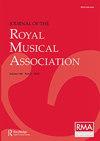音乐、噪音和冲突:关于声音的社会技术想象、声学代理和本体论假设
IF 0.5
2区 艺术学
0 MUSIC
引用次数: 0
摘要
在1969年的一次采访中,意大利作曲家路易吉·诺诺表示,“如果一首乐谱不能挑起或煽动革命,它可以通过参与知识和革命霸权来为革命做出贡献。”1根据安东尼奥·葛兰西的作品,诺诺认为作曲家是知识分子,有责任通过作品中使用的技术手段和材料来催化或放大他们时代的社会斗争,录音带或音乐会是革命斗争的行动场所和表现:“乐谱可以成熟并演变为对斗争的直接和具体参与,可以面对并转化为乐谱。”3他相信音乐体验能够通过双重聆听来重新配置现实——作曲家对革命斗争的聆听,以及观众对由此产生的音乐作品的聆听。此外,诺诺提出了技术、霸权和声波档案使用之间的直接联系。正如我在其他地方所研究的那样,在20世纪60年代和70年代初,诺诺相信本文章由计算机程序翻译,如有差异,请以英文原文为准。
Music, Noise and Conflict: Sociotechnical Imaginaries, Acoustic Agency and Ontological Assumptions about Sound
In a 1969 interview, the Italian composer Luigi Nono stated that, ‘If a score cannot provoke or incite revolution, it can contribute to it by participating in intellectual and revolutionary hegemony.’1 Drawing on the work of Antonio Gramsci, Nono considered composers as intellectual workers with a responsibility to catalyse or amplify the social struggles of their times through the technical means and material employed in their works.2 The scores, tapes or concerts were sites of action and representation of revolutionary struggles: ‘A score can mature and evolve into direct and concrete participation of the struggle, which can be confronted and transposed into the score.’3 He believed that the musical experience was capable of reconfiguring reality through dual listening – the composer’s listening to revolutionary struggle, and audiences’ listening to the resulting musical works. Furthermore, Nono proposed a direct link between technology, hegemony and the use of sonic archives. As I have examined elsewhere, in the 1960s and the early 1970s Nono believed
求助全文
通过发布文献求助,成功后即可免费获取论文全文。
去求助
来源期刊
CiteScore
0.50
自引率
0.00%
发文量
16
期刊介绍:
The Journal of the Royal Musical Association was established in 1986 (replacing the Association"s Proceedings) and is now one of the major international refereed journals in its field. Its editorial policy is to publish outstanding articles in fields ranging from historical and critical musicology to theory and analysis, ethnomusicology, and popular music studies. The journal works to disseminate knowledge across the discipline and communicate specialist perspectives to a broad readership, while maintaining the highest scholarly standards.

 求助内容:
求助内容: 应助结果提醒方式:
应助结果提醒方式:


